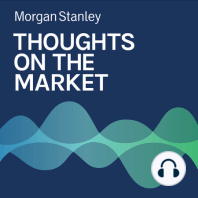3 min listen

Michelle Weaver: The Priorities of the U.S. Consumer
Michelle Weaver: The Priorities of the U.S. Consumer
ratings:
Length:
3 minutes
Released:
Oct 9, 2023
Format:
Podcast episode
Description
While U.S. consumer sentiment is on the decline, there are some categories that have remained stable as purse strings tighten.----- Transcript -----Welcome to Thoughts on the Market. I'm Michelle Weaver from the Morgan Stanley U.S. Equity Strategy Team. Along with my colleagues bringing you a variety of perspectives, today I'll give you an update on the U.S. consumer. It's Monday, October 9th at 10 a.m. in New York. As we get into the fall season and close out the third quarter of this year, investors are paying attention to the state of the U.S. consumer. Our recent survey work reveals that inflation continues to be a primary concern for consumers and that the U.S. political environment is the second most significant concern. Furthermore, consumers continue to worry about their payment obligations, and 30% of people we surveyed expressed concern over their potential inability to repay debts. Low income consumers are generally more worried about their inability to pay rent, while upper income consumers are concerned about their investments, U.S. politics and geopolitics. Overall, consumer confidence in the U.S. economy and household finances worsened modestly in September. More than half of U.S. consumers are expecting the economy to get worse in the next six months, while less than a quarter of consumers are expecting the economy to get better. This worsening sentiment is also consistent across different income cohorts. Additionally, savings rates continue to trend lower versus earlier this year. Consumers report having an average savings reserve of 4.2 months, the average over the past few months has been trending lower compared to earlier in the year. Of course, savings reserves vary significantly by income though, with upper income consumers having on average around 6 to 7 months worth of expenses in savings compared to about 3 months for low income cohorts. Positively fewer consumers reported missing or being late on a loan or bill payment, with 34% missing a payment last month versus 38% in August. Low income consumers are more likely to have missed or been late on payments versus middle and high income consumers. Consumer spending intentions across income cohorts for the next month are similar to last month, with 31% of consumers expecting to spend more next month and 19% expecting to spend less. Consumers continue to prioritize essential categories like groceries and household items, but plan to spend less on more discretionary products like electronics, leisure and entertainment, small appliances and food away from home. Interesting to note, cell phone bills continue to be a clear priority for consumers. Travel intentions have also remained relatively stable. Over half of consumers are planning to travel over the next six months, mostly to visit friends and family, which is slightly up from last year. Not surprisingly, travel spending is higher for high income consumers than for low and middle income ones. However, we have seen plans for international travel start to decline. Thank you for listening. If you enjoy the show, please leave us a review on Apple Podcasts and share Thoughts on the Market with a friend or colleague today.
Released:
Oct 9, 2023
Format:
Podcast episode
Titles in the series (100)
Andrew Sheets: For Markets, Signs, Signs, Everywhere Signs by Thoughts on the Market